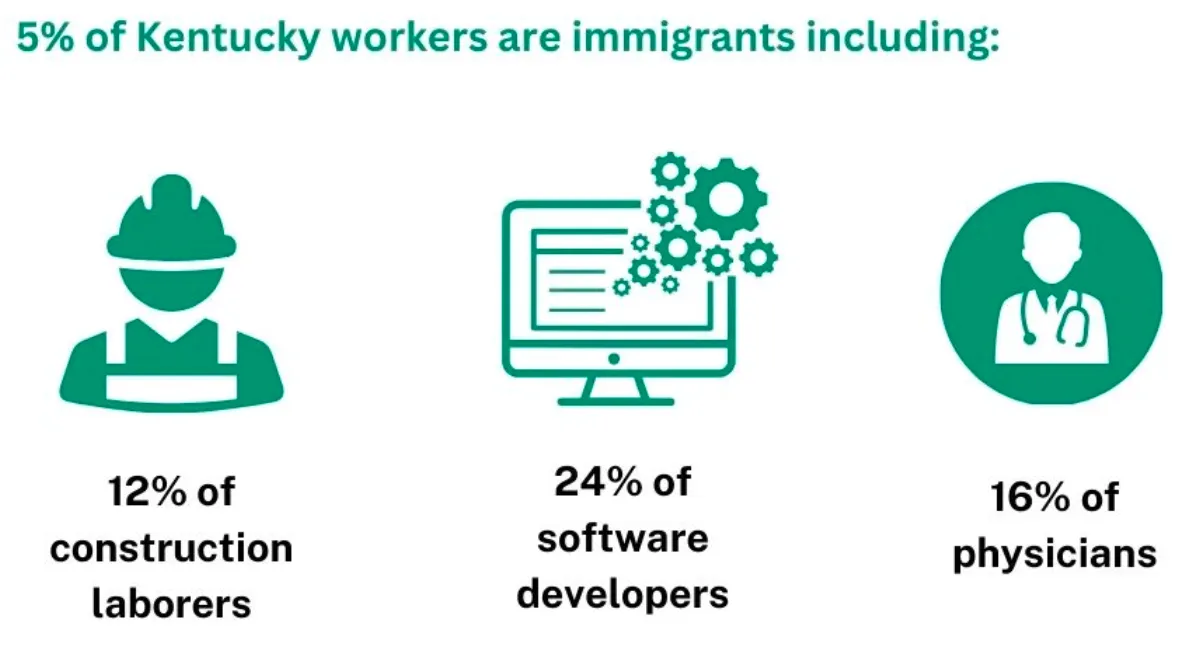Table of Contents
Last week, Republicans in the state Senate debuted SB2, a law requiring voters to possess a photo ID in order to cast a ballot. Supported by newly-elected Republican Secretary of State Michael Adams, SB2 appears to be part of a larger effort to “improve trust” in Kentucky elections.
Here’s what’s in the proposed Voter ID bill
Currently, Kentucky has a broad definition of ID used for voting, including a poll worker knowing you. Photo IDs are fine, but not required. The National Conference of State Legislatures classifies Kentucky as having a “non-strict” ID law. This is the most common type nationwide. 10 states are stricter and 14 states do not require ID (there’s a temporary injunction on North Carolina’s law).
The new law would require voters to produce an ID with their name, photo, and an expiration date. Any voter without proper ID would have to fill out a provisional ballot and would be required to visit the county clerk’s office by the Friday after the election, providing an affidavit in order for their ballot to count.
The proposal creates a system for voters without photo ID to receive one for free, though there are of course hidden costs for people trying to get them.
The Secretary of State called this bill “humane,” which is an unusual or perhaps troubling term to describe a voting bill.
Critics have rightly pointed out that the photo requirement is more likely to affect minorities. Black voters, for example, are over three times more likely to not possess a photo ID. Photo ID laws disproportionately lower turnout among minorities.
One feature of the proposal that is of particular interest is the expiration date requirement. First of all, whether or not an ID has expired shouldn’t affect the photo. If my driver’s license has expired, it still has my picture on it. This is of particular concern for older voters who no longer drive as they may have an expired license.
This also affects student IDs. While student IDs are acceptable in the proposal, they must still have an expiration date on them, which most do not.
While nominally meant to ensure that voters are who they claim to be when they show up to the polls, this is an additional burden that makes it harder to vote, and seems to target minorities, older voters, and college students.
Three reasons this is a bad bill
It’s trying to solve a problem that doesn’t exist.
The nationwide focus among Republican leaders on voter fraud is by now standard practice. Policies such as photo IDs, voter purges, and more onerous registration processes are commonly put forth as a solution to the perceived millions of illegitimate ballots being cast.
But even with this wide focus, voter fraud is virtually non-existent (despite the claims of our thankfully former Governor). In one study, only 31 instances of actual voter fraud were found out of more than a billion ballots cast. It is just not a real issue.
Some supporters of these bills point to people casting ballots at the wrong location. Often people will move and not know where to vote. Their polling location or district may shift and they could be unaware of it. This is a misunderstanding, not anything malicious. There’s a significant difference between a paperwork error and voter fraud.
The “solution” actually lowers turnout
Past studies have found that voter ID laws such as SB2 have lowered voter turnout in states by around 3 percentage points. If SB2 had been in place before the 2019 Kentucky General Election, it would have resulted in more than 40,000 fewer votes cast. Advocates of this sort of bill claim to want to protect election integrity. But it seems proponents love voting so much they want to ensure fewer people do it.
Even if this type of law doesn’t lower turnout (which again, it does), it still increases the barriers for those without IDs to vote, and making certain groups jump over more hurdles to exercise their rights should not be a goal of any legislature.
Photo ID programs are expensive
From a purely budgetary standpoint, SB2 makes still less sense. Organizing this level of bureaucracy and issuing IDs will be expensive, and Republicans seem prepared to spend a lot of money to solve a non-existent problem.
And while Secretary of State Adams estimated that the program would cost in the low six figures, when Indiana implemented a version of this law, the state spent over $10 million in the first four years alone. Based on Kentucky’s 15-year-long struggle to comply with the Real ID Act, the likelihood of any such program being successfully and effectively implemented by November seems slim.
Adding to the cost are the lawsuits which are almost certain to follow.
We should expand access, instead of trying to limit it.
The goal of every policy maker (and especially our chief elections officer) should be to expand access to voting, not limit it. Several states are working to do that.
Currently 16 states use Automatic Voter Registration, which registers voters and updates information more frequently to maintain accurate information. AVR increases the number of voters and is both easier and cheaper than the options proposed Republicans in Frankfort.
Our leaders could also put their efforts into expand voting hours, allow for early voting, and improve voting for people with disabilities. This would make it easier for people to cast ballots.
Instead of this, our leaders appear to want to make voting more difficult. Kentucky is currently one of the 10 hardest states to vote in. SB2 will not help that situation, and neither will the likely voter purges that we can expect to see. This bill will stop thousands from casting legitimate ballots.
Maintaining accurate voter files and election integrity is important. But instead of doing things which would actually help, Republicans are using non-existent threats to increase levels of disenfranchisement.
–30–








